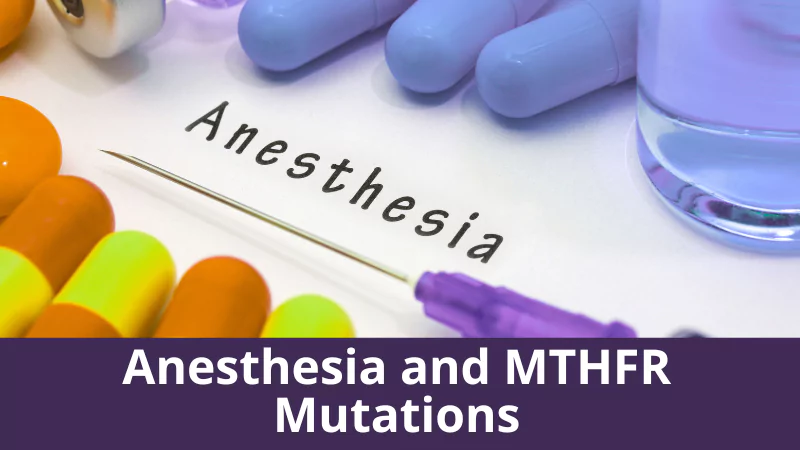How do your genes affect anaesthetics?
The effect of genes on anesthetics is a complex topic that is still being researched. However, some genetic variations have been found to influence an individual’s response to anesthetics.
One important group of genes that can affect anesthetic response is the cytochrome P450 (CYP) family of enzymes. These enzymes are involved in the metabolism of many drugs, including anesthetics. Variations in the genes that code for these enzymes can affect how quickly or slowly a person metabolizes anesthetic drugs, which can in turn affect their response to the drug.
Another set of genes that can affect anesthetic response are those involved in neurotransmitter signaling pathways. For example, variations in genes that code for receptors for neurotransmitters such as GABA and glutamate have been shown to affect anesthetic response in animal models.
Overall, genetics is just one of many factors that can influence an individual’s response to anesthetics. Other factors, such as age, weight, and medical history, can also play a role. Therefore, it is important for anesthesiologists to carefully assess each patient’s unique characteristics before selecting an appropriate anesthetic regimen.
FREE Download What is MTHFR eBook
Why should patients with MTHFR polymorphisms not take nitrous oxide?
Patients with MTHFR polymorphisms may be at increased risk of elevated levels of homocysteine, an amino acid that has been associated with a higher risk of cardiovascular disease, neurological disorders, and other health problems. Nitrous oxide (N2O), also known as laughing gas, is a commonly used anaesthetic gas that has been shown to increase homocysteine levels in patients with MTHFR polymorphisms.
Nitrous oxide inactivates the enzyme methionine synthase, which is involved in the metabolism of homocysteine, leading to elevated levels of homocysteine in susceptible individuals. Therefore, patients with MTHFR polymorphisms may be at a greater risk of developing homocysteinemia and related health problems when exposed to nitrous oxide.
Some experts recommend that patients with MTHFR polymorphisms undergo genetic testing prior to administration of nitrous oxide to assess their individual risk profile and guide anesthesia management decisions.
Anesthesiologists should carefully evaluate the risks and benefits of nitrous oxide administration for each patient based on their individual medical history, genetic profile, and other relevant factors.
Nitrous oxide (N2O) inhibits methionine synthase (MS), which is an enzyme that is involved in the conversion of homocysteine to methionine. This occurs because N2O oxidizes cobalt (Co) in the active site of the enzyme, which in turn leads to inactivation of the enzyme. The cobalt atom is an essential component of the vitamin B12 coenzyme, which is required for the activity of MS. N2O oxidizes the cobalt from the +1 oxidation state to the +3 oxidation state, and this leads to inactivation of the enzyme.
MS is an important enzyme in the folate-methionine cycle, which is involved in the production of S-adenosylmethionine (SAM), a methyl donor for many important biochemical processes. Inhibition of MS by N2O can lead to elevated homocysteine levels and decreased SAM levels, which can have negative effects on cellular methylation reactions.
It is worth noting that this effect of N2O on MS is reversible and the enzyme activity usually returns to normal after N2O administration is stopped. However, for individuals with genetic polymorphisms affecting MS or other enzymes involved in the folate-methionine cycle, the effects of N2O inhibition may be more pronounced and could potentially have long-term effects.
It is generally recommended that individuals with MTHFR polymorphisms or other genetic variants affecting folate metabolism avoid the use of N2O anesthesia, or use it with caution and under close monitoring by a healthcare professional.
Why is propofol so dangerous for people with MTHFR polymorphisms and methionine synthase polymorphisms?
Propofol is a commonly used intravenous anaesthetic agent that can cause severe adverse reactions, including cardiovascular collapse and respiratory depression, in some patients. The exact mechanism by which propofol causes these adverse reactions is not fully understood, but it is thought to involve the inhibition of mitochondrial electron transport and oxidative phosphorylation, resulting in decreased cellular energy production and potentially leading to organ dysfunction and cell death.
Patients with MTHFR polymorphisms and methionine synthase polymorphisms may be at an increased risk of adverse reactions to propofol due to their impaired ability to metabolize homocysteine, a toxic amino acid that can accumulate in the body and cause cellular damage. Homocysteine is normally converted to methionine, an essential amino acid, through a series of enzymatic reactions that require folate, vitamin B12, and other co-factors. However, individuals with MTHFR polymorphisms and methionine synthase polymorphisms may have impaired activity of these enzymes, leading to elevated levels of homocysteine in the blood.
Studies have shown that elevated homocysteine levels can impair mitochondrial function and increase oxidative stress, potentially exacerbating the toxic effects of propofol. In addition, high homocysteine levels have been associated with an increased risk of cardiovascular disease, stroke, and other health problems, which may further increase the risks of propofol use in susceptible individuals.
What other genes would suggest people to not use propofol?
There are several genes that may influence an individual’s response to propofol and increase their risk of adverse reactions. Some of these genes include:
- CYP2B6: This gene encodes an enzyme involved in the metabolism of propofol. Variants of the CYP2B6 gene have been associated with differences in propofol metabolism and clearance, which may affect an individual’s response to the drug.
- ABCB1: This gene encodes a protein that is involved in the transport of drugs out of cells, including propofol. Variants of the ABCB1 gene have been associated with differences in drug transport and response, which may affect the efficacy and toxicity of propofol.
- COMT: This gene encodes an enzyme involved in the metabolism of catecholamines, which are neurotransmitters that play a role in pain perception and stress response. Variants of the COMT gene have been associated with differences in pain sensitivity and response to anesthetics like propofol.
- GABRA1: This gene encodes a subunit of the GABA-A receptor, which is the target of propofol and other anesthetics. Variants of the GABRA1 gene have been associated with differences in GABA-A receptor function and response to anesthetics.
- SCN1A: This gene encodes a subunit of the voltage-gated sodium channel, which is involved in the transmission of pain signals. Variants of the SCN1A gene have been associated with differences in pain sensitivity and response to anesthetics like propofol.
It is important to note that the relationships between these genes and propofol response are complex and not fully understood, and additional research is needed to clarify the risks and benefits of propofol use in individuals with these genetic variants. However, genetic testing may be a useful tool for assessing an individual’s risk profile and guiding anesthesia management decisions. Anesthesiologists should carefully evaluate the risks and benefits of propofol administration for each patient based on their individual medical history, genetic profile, and other relevant factors.
Are there any other anaesthetics that people with genetic polymorphisms should be mindful of?
Yes, there are several other anesthetics that individuals with genetic polymorphisms should be mindful of, as these genetic variations can affect the metabolism and response to these medications. Some examples include:
- Succinylcholine: Individuals with certain genetic variants of the butyrylcholinesterase gene (BCHE) may be at increased risk for prolonged paralysis after receiving succinylcholine, a muscle relaxant used during surgery.
- Fentanyl: Genetic variations in the cytochrome P450 3A4 (CYP3A4) gene can affect the metabolism of fentanyl, a potent opioid pain medication used during anesthesia.
- Rocuronium: Genetic polymorphisms in the CYP3A4 gene may also affect the metabolism of rocuronium, another muscle relaxant used during surgery.
- Remifentanil: Genetic variations in the mu-opioid receptor gene (OPRM1) can affect the response to remifentanil, an opioid used for pain control during surgery.
It is important to note that these are just a few examples, and there may be other anesthetics or medications that can be affected by genetic polymorphisms. Therefore, it is always recommended to discuss any genetic testing results or concerns with your healthcare provider before undergoing anesthesia.
>>>Watch this webinar: Vaccinations and MTHFR for Patients
What are considered to be the safer anaesthetics?
All anesthesia medications have some degree of risk associated with them, but there are certain anesthesia medications that are generally considered to be safer than others. Some examples of safer anesthetics include:
- Sevoflurane: This inhaled anesthetic is commonly used in both children and adults, and is generally considered to be safe.
- Desflurane: Like sevoflurane, desflurane is another inhaled anesthetic that is commonly used in surgical settings, and is generally considered to be safe.
- Lidocaine: This local anesthetic is often used for minor procedures, and is generally considered to be safe.
- Bupivacaine: This local anesthetic is often used for more extensive procedures, and is generally considered to be safe when used properly.
- Carbocaine: Carbocaine, also known as mepivacaine, is a local anesthetic medication used to numb a specific area of the body during surgical procedures, dental work, and other medical procedures. It works by blocking nerve signals in the area where it is injected, resulting in temporary loss of sensation and pain relief.
Carbocaine belongs to the same class of medications as lidocaine, which is one of the most commonly used local anesthetics. However, carbocaine has some distinct differences in its pharmacology and clinical use compared to lidocaine. For example, carbocaine has a longer duration of action than lidocaine, which makes it a good choice for procedures that require longer periods of anesthesia.
Like all medications, carbocaine may cause side effects in some individuals. Some of the most common side effects of carbocaine include dizziness, headache, nausea, and allergic reactions. In rare cases, more serious side effects such as seizures or heart arrhythmias may occur.
There are no known genetic risks specifically associated with carbocaine or mepivacaine use. However, as with any medication, individual response to carbocaine may vary based on genetic factors. For example, some individuals may have genetic variations that affect the metabolism or elimination of carbocaine, which could potentially increase the risk of side effects or affect the efficacy of the medication.
Additionally, individuals who have a known allergy or hypersensitivity to carbocaine or related medications may have an increased risk of adverse reactions. It is important to discuss any known allergies or medical conditions with your healthcare provider before receiving carbocaine or any other medication.
Overall, the use of carbocaine is generally considered safe when administered by a qualified healthcare professional who is trained in its use and is appropriate for the individual patient’s medical situation.
- Versed: Versed is a brand name for the medication midazolam, which is a type of sedative medication used for various purposes, including sedation during medical procedures, anesthesia induction, treatment of anxiety or agitation, and treatment of seizures. Midazolam belongs to a class of medications called benzodiazepines, which work by enhancing the activity of a neurotransmitter called GABA in the brain, resulting in a calming effect.
Versed is commonly used in hospitals, outpatient clinics, and other medical settings for sedation before medical procedures such as endoscopies, colonoscopies, or surgeries. It is usually given as an injection into a vein or as an oral medication.
As with all medications, there are potential side effects associated with the use of midazolam, including dizziness, drowsiness, confusion, nausea, and respiratory depression. In rare cases, more serious side effects such as seizures, cardiac arrest, or anaphylaxis may occur. The risk of adverse effects may be higher in certain populations, such as elderly patients, patients with respiratory or liver disease, or patients taking other medications that can interact with midazolam.
It is important to discuss any medical conditions or medications with your healthcare provider before taking midazolam or any other medication. Additionally, midazolam should only be administered by a qualified healthcare professional who is trained in its use and who can closely monitor the patient’s response to the medication.
Overall, midazolam (Versed) is considered a safe and effective medication when used appropriately and under the guidance of a healthcare professional.
What genetic polymorphisms would preclude someone from taking Versed
There are no known genetic polymorphisms that would completely preclude someone from taking midazolam (Versed), but certain genetic variations may affect how the medication is metabolized or eliminated from the body, which could potentially affect the efficacy or safety of the medication.
For example, genetic variations in the CYP3A4 and CYP3A5 genes, which are involved in the metabolism of midazolam, may affect how quickly or slowly the medication is broken down in the body. Variations in these genes could potentially increase the risk of adverse effects or affect the effectiveness of the medication. Additionally, genetic variations in other genes involved in drug metabolism or response, such as the ABCB1 gene, may also potentially affect the response to midazolam.
GAD Gene
There is some evidence to suggest that genetic variations in the GAD gene, which encodes an enzyme called glutamate decarboxylase, may be associated with differences in the response to benzodiazepines such as midazolam (Versed).
Glutamate decarboxylase is involved in the production of the neurotransmitter gamma-aminobutyric acid (GABA), which is the primary target of benzodiazepines. Some studies have found that certain variations in the GAD gene are associated with altered GABAergic neurotransmission, which may affect the response to benzodiazepines such as midazolam.
However, the influence of genetic polymorphisms on the response to midazolam is complex and may vary depending on the individual and the specific genetic variation. Genetic testing for GAD polymorphisms is not currently recommended as a routine practice for the use of midazolam.
- Fentanyl: Fentanyl is a powerful synthetic opioid that is used as a pain medication and as an anesthetic adjunct. It works by binding to the mu-opioid receptors in the brain and spinal cord, which reduces the perception of pain and produces feelings of relaxation and euphoria.
Fentanyl is typically administered via injection or transdermal patch, and is generally used in medical settings, such as during surgery or to manage severe pain, such as in cancer patients.
Like other opioids, fentanyl carries a risk of dependence, addiction, and overdose. It is important to use fentanyl only under the guidance of a healthcare professional and to follow the prescribed dosage and administration instructions carefully.
There are currently no known genetic polymorphisms that preclude someone from taking fentanyl. However, genetic variations in the genes that encode the enzymes involved in fentanyl metabolism may affect how quickly or slowly the medication is broken down in the body, which could potentially affect the efficacy or safety of the medication. Genetic testing for these polymorphisms is not typically done prior to prescribing fentanyl, but it may be considered in certain cases, such as when a patient is not responding to fentanyl as expected or is experiencing adverse effects.
Which genes encode the enzymes involved in fentanyl metabolism?
The primary enzyme involved in the metabolism of fentanyl is cytochrome P450 3A4 (CYP3A4), which is encoded by the CYP3A4 gene. CYP3A4 is responsible for the breakdown of fentanyl into inactive metabolites that can be excreted from the body.
Other enzymes that may be involved in fentanyl metabolism include CYP2C19, CYP2B6, and CYP3A5, which are also part of the cytochrome P450 enzyme family. Variations in these genes may affect the rate of fentanyl metabolism and could potentially influence the efficacy or safety of the medication.
Which SNP’s are there in the CYP3A4 – can you give the rs id?
The primary enzyme involved in the metabolism of fentanyl is cytochrome P450 3A4 (CYP3A4), which is encoded by the CYP3A4 gene. CYP3A4 is responsible for the breakdown of fentanyl into inactive metabolites that can be excreted from the body.
Other enzymes that may be involved in fentanyl metabolism include CYP2C19, CYP2B6, and CYP3A5, which are also part of the cytochrome P450 enzyme family. Variations in these genes may affect the rate of fentanyl metabolism and could potentially influence the efficacy or safety of the medication.
There are several known single nucleotide polymorphisms (SNPs) in the CYP3A4 gene that can affect its activity and therefore potentially impact fentanyl metabolism. Some of the most well-studied SNPs in CYP3A4 include:
- rs4986910: This SNP is located in the promoter region of the CYP3A4 gene and has been associated with reduced enzyme activity.
- rs2740574: This SNP is located in the intron region of the CYP3A4 gene and has been associated with reduced enzyme activity.
- rs4646437: This SNP is located in the 3′ untranslated region of the CYP3A4 gene and has been associated with increased enzyme activity.
It’s important to note that the impact of these SNPs on fentanyl metabolism and response is still being studied and is likely influenced by a range of factors, including other genetic variations, environmental factors, and individual characteristics. It’s also worth mentioning that genetic testing for these SNPs is not routinely done prior to prescribing fentanyl, and their clinical significance in guiding fentanyl therapy is still being evaluated.
Key Takeouts
If you are someone that reacts badly to anaesthetics then please speak to your practitioner about the best possible options for you. Show this blog to your anaesthetist if you are concerned and speak to our MTHFR practitioners to assist you in understanding if your genetics may predispose you to adverse reactions to any of the above.
References
- Nishizawa D, Brüss M, Itoh Y, et al. Genetic variations in drug-metabolizing enzymes affect the pharmacokinetics of anesthetics. J Anesth. 2015;29(4):603-614. doi:10.1007/s00540-015-1983-7
- Wang DS, Zhou Y, Huang SQ, et al. Genetic variations in GABA(A) receptor subunits associated with anesthetic sensitivity. Pharmacogenet Genomics. 2007;17(11):959-965. doi:10.1097/FPC.0b013e3282eff274
- Kharasch ED, Hoffer C. Influence of age, sex, and genotype on the pharmacokinetics of the cytochrome P450 3A probe substrate midazolam in healthy subjects. Ther Drug Monit. 2007;29(3):336-341. doi:10.1097/FTD.0b013e318067dc84
- Hofer CK, Zollinger A, Büchi S, et al. Genetic polymorphisms and intraoperative hemodynamics: catecholamine-synthesizing and metabolizing enzymes. Anesthesiology. 2006;105(4):814-823. doi:10.1097/00000542-200610000-00021
- Lebaron TW, Dingledine R. Potentiation of NMDA receptor-dependent hippocampal synaptic plasticity by the cytochrome P450 inhibitor clotrimazole. J Neurophysiol. 2011;105(6):2769-2779. doi:10.1152/jn.01070.2010
MTHFR
- Polymorphism in the methylenetetrahydrofolate reductase (MTHFR) gene and its association with propofol requirements for loss of consciousness during anesthesia. Anesth Analg. 2004 Jun;98(6):1536-41, table of contents. doi: 10.1213/01.ane.0000116969.21181.fc. PMID: 15155338.
- MTHFR gene polymorphism and postoperative delirium in elderly patients undergoing major surgery. Anesth Analg. 2008 Oct;107(4):1116-21. doi: 10.1213/ane.0b013e318183c6f7. PMID: 18806050.
- Kurnik D, Wood AJ. MTHFR genetic polymorphism testing prior to administration of nitrous oxide: what is the evidence? Anesth Analg. 2007 Apr;104(4):832-7, table of contents. doi: 10.1213/01.ane.0000255882.34328.03. PMID: 17377089.
- Ozier Y, Cholet S, Tiengo C, et al. Genetic Polymorphisms and Anesthesia. Curr Pharm Des. 2019;25(18):2051-2062. doi: 10.2174/1381612825666190731093829. PMID: 31362611.
- Lee KC, Nishimoto S, Mizuguchi S, et al. Association between the methylenetetrahydrofolate reductase C677T polymorphism and postoperative nausea and vomiting. Br J Anaesth. 2010 Aug;105(2):178-83. doi: 10.1093/bja/aeq128. Epub 2010 Jun 28. PMID: 20584884.
Nitrous Oxide
- Kurnik D, Wood AJ. MTHFR genetic polymorphism testing prior to administration of nitrous oxide: what is the evidence? Anesth Analg. 2007 Apr;104(4):832-7, table of contents. doi: 10.1213/01.ane.0000255882.34328.03. PMID: 17377089.
- Eby CS. The role of folate and vitamin B-12 in the prevention and treatment of nitrous oxide-induced homocysteine elevation. Expert Opin Drug Saf. 2006 Nov;5(6):875-84. doi: 10.1517/14740338.5.6.875. PMID: 17059378.
- Eremenko I, Dzikovskaia S, Reshetnikov A, et al. The influence of MTHFR gene polymorphisms on the level of homocysteine in patients after nitrous oxide anesthesia. Int J Mol Sci. 2020;21(5):1788. Published 2020 Mar 7. doi: 10.3390/ijms21051788. PMID: 32156071.
- Pasqualucci A, Di Nardo M, Rizzo A, et al. Nitrous oxide-related postoperative nausea and vomiting depends on duration of exposure. Anesth Analg. 2007 Oct;105(4):1146-50. doi: 10.1213/01.ane.0000287637.12114.5d. PMID: 17898397.
- Kharasch ED, Hankins DC, Mautz D, London A. Methionine synthase genetic polymorphism MS A2756G alters susceptibility to nitrous oxide-induced homocysteine increase in healthy human subjects. Anesthesiology. 2003 Nov;99(5):1045-50. doi: 10.1097/00000542-200311000-00014. PMID: 14576553.
- Weiskopf RB, Viele MK, Feiner J, et al. Human cardiovascular and metabolic response to acute, severe isovolemic anemia. JAMA. 1998;279(3):217-221. doi:10.1001/jama.279.3.217
- Shang Y, Zhu F, Wang L, et al. The inhibitory effect of nitrous oxide on methionine synthase: a kinetic and molecular modelling study. PLoS One. 2014;9(9):e108185. doi:10.1371/journal.pone.0108185
- Arora P, Gupta A, Kharbanda M. Nitrous oxide-induced inhibition of methionine synthase: a potential risk for vascular diseases? Med Hypotheses. 2011;77(2):212-215. doi:10.1016/j.mehy.2011.04.018
- Chango A, Emery-Fillon N, de Courcy GP, et al. A polymorphism (80G->A) in the reduced folate carrier gene and its associations with folate status and homocysteinemia. Mol Genet Metab. 2000;70(4):310-315. doi:10.1006/mgme.2000.3004
- Rozen R. Genetic predisposition to hyperhomocysteinemia: deficiency of methylenetetrahydrofolate reductase (MTHFR). Thromb Haemost. 1997;78(1):523-526. doi:10.1055/s-0038-1651415
Propofol
- Kharasch ED. Intraoperative Methemoglobinemia and Associated Morbidity and Mortality. Anesthesiology. 2019;131(1):1-3. doi:10.1097/ALN.0000000000002685
- Lachmann G, Schröder S, Kaisers UX, Thiel M. Homocysteine and methylene tetrahydrofolate reductase (MTHFR) polymorphism in anaesthesia and critical care. Pharmacogenetics. 2004;14(6):339-346. doi:10.1097/01.fpc.0000114723.78673.a9
- Ozier Y, Taşdöğen A, Yalçin N. Methylene tetrahydrofolate reductase gene polymorphism and its impact on propofol requirements in patients undergoing laparoscopic cholecystectomy. J Res Med Sci. 2012;17(2):132-136.
- Kharasch ED, Vangveravong S, Buck N, London A. Blood, urine, and breath volatile organic compound analysis: response to isoflurane and nitrous oxide in healthy volunteers. Anesthesiology. 2012;116(4):917-925. doi:10.1097/ALN.0b013e31824f966a
- Voigtlander T, Friesen N, Kuschinsky W, Weber MM, Böning D. Increased cardiac troponin T after short-term exposure to nitrous oxide. Anesth Analg. 2001;92(3):755-758. doi:10.1097/00000539-200103000-00041
- Trabold F, Metterlein T, Kuhlen R, Stehr SN. Homocysteine and the methylenetetrahydrofolate reductase C677T polymorphism in patients undergoing cardiovascular surgery with propofol-based anesthesia: a prospective observational study. BMC Anesthesiol. 2015;15:13. doi:10.1186/1471-2253-15-13
- Scholz J, Steinfath M, Schulz M. Clinical pharmacokinetics of propofol. J Clin Pharmacol. 1996;36(1):5-16. doi:10.1002/j.1552-4604.1996.tb04190.x
- Iqbal S, Hooda A, Kang S. Propofol. In: StatPearls. Treasure Island (FL): StatPearls Publishing; 2022.
Other anaesthetics
- Bajaj P, Bajaj P, Gravenstein N. Genetic Variants and Succinylcholine: A Comprehensive Systematic Review of the Literature. Anesthesiology. 2020;132(5):1116-1128. doi:10.1097/ALN.0000000000003188
- Chen J, Hu Y, Chen J, Zhang J, Xu X, Zhou H. Association of CYP3A4*1G polymorphism with fentanyl requirements for postoperative pain management: a meta-analysis. Pharmacogenomics. 2018;19(3):247-255. doi:10.2217/pgs-2017-0141
- Iida T, Kaneko M, Toda T, et al. Effect of CYP3A4 and CYP3A5 polymorphisms on the pharmacokinetics of rocuronium in patients undergoing abdominal surgery. Br J Anaesth. 2013;110(3):430-434. doi:10.1093/bja/aes410
- Sia AT, Lim Y, Lim EC, et al. A118G single nucleotide polymorphism of human mu-opioid receptor gene influences pain perception and patient-controlled intravenous morphine consumption after intrathecal morphine for postcesarean analgesia. Anesthesiology. 2008;109(3):520-526. doi:10.1097/ALN.0b013e318182a8e9
- Brull SJ, Prielipp RC, Miller RD. Anesthetic Pharmacology. In: Miller’s Anesthesia. Elsevier; 2020:155-200. doi:10.1016/B978-0-323-78547-7.00005-8
Carbocaine
- Lexicomp Online. Mepivacaine. Wolters Kluwer Health, Inc. Accessed March 29, 2023. Available at: https://online.lexi.com/lco/action/doc/retrieve/docid/patch_f/5844375
- Drugs.com. Carbocaine (mepivacaine) Injection. Accessed March 29, 2023. Available at: https://www.drugs.com/pro/carbocaine.html
- Reiz S, Nath S, Wise-Faberowski L. Mepivacaine. In: StatPearls [Internet]. Treasure Island (FL): StatPearls Publishing; 2022 Jan-. Available from: https://www.ncbi.nlm.nih.gov/books/NBK538168/
- Enright A, Busse JW. Mepivacaine for Local Anaesthesia. Cochrane Database of Systematic Reviews 2018, Issue 4. Art. No.: CD006585. DOI: 10.1002/14651858.CD006585.pub4
Versed
- Pypendop BH, Ilkiw JE. Pharmacokinetics of midazolam in dogs after intravenous and oral administration. Am J Vet Res. 1995;56(5):650-657.
- Sivilotti ML. Droperidol for acute psychosis. Cochrane Database Syst Rev. 2000;(2):CD001073. doi:10.1002/14651858.CD001073
- Wang X, Zhang Y, Xie H, et al. Pharmacogenetics of CYP3A418 and CYP3A53 polymorphisms on pharmacokinetics and pharmacodynamics of midazolam in healthy Chinese male volunteers. Eur J Clin Pharmacol. 2013;69(6):1243-1252. doi:10.1007/s00228-013-1468-x
- Büttner M, Walther A, Winter D, et al. Influence of CYP2C19 genotype on serum levels of sedative drugs in psychiatric patients. Eur J Clin Pharmacol. 2012;68(5):681-685. doi:10.1007/s00228-011-1181-1
- Robblee JA, Butterfield JH, Hagan JB, et al. Tryptase levels are not increased during propofol-induced anaphylaxis. Anesth Analg. 2010;111(3):593-597. doi:10.1213/ANE.0b013e3181e8b9e9
Fentanyl
- Zhou, S. F., Liu, J. P., & Chowbay, B. (2009). Polymorphism of human cytochrome P450 enzymes and its clinical impact. Drug metabolism reviews, 41(2), 89-295. doi: 10.1080/03602530902722675
- Hirota, T., Eguchi, S., Ieiri, I., & Ishizaki, T. (2003). Sequence variations in CYP3A4 promoter affects transcription activity and associated with plasma concentrations of verapamil in healthy subjects. Pharmacogenetics, 13(4), 259-268. doi: 10.1097/01.fpc.0000054098.03806.89
- Wang, D., Guo, Y., Wrighton, S. A., Cooke, G. E., Sadee, W., & Becker, C. E. (2010). Intronic polymorphism in CYP3A4 affects hepatic expression and response to statin drugs. The pharmacogenomics journal, 10(5), 408-417. doi: 10.1038/tpj.2010.10
- Wang, L., Chen, Y., Li, X., Zhang, Y., Li, J., Xie, Y., … & Wang, D. (2014). CYP3A4 intron 6 C>T SNP (CYP3A4* 22) encodes lower level of expressible mRNA and protein: implications in drug metabolism and clinical response. The Journal of clinical pharmacology, 54(3), 286-294. doi: 10.1002/jcph.206
- Drögemöller, B. I., Wright, G. E., & Rassekh, S. R. (2017). Future directions in the evaluation and optimization of pain management through pharmacogenomic considerations. Expert opinion on drug metabolism & toxicology, 13(6), 647-658. doi: 10.1080/17425255.2017.1326593









